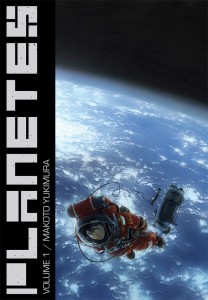By Makoto Yukimura. Released in Japan by Kodansha, serialized in the magazine Weekly Morning. Released in North America by Dark Horse Comics.
This title has been a fan favorite ever since Tokyopop first released it back in 2003. Now it’s rescued, with a new translation, color artwork throughout, and a larger trim size as two omnibuses. This first one covers the first 12 chapters, ending with Hachimaki’s vision quest, which is an excellent cliffhanger. Rereading it, I was reminded why I found the series so enthralling – it combines interesting and flawed characters, a political thriller plot, and of course the beauty of space exploration, and why people want to go to space, though it makes sure to note that sometimes what people do to get to space can be morally questionable.
Like many titles, the series starts off feeling like a series of one-shots, possibly as it was – many titles are given a chapter or two before they get picked up, which also explains such glitches as Hachimaki’s hair. From the start, though, we have the basical – Hachimaki, Yuri and Fee command a debris collecting ship, making sure that the worst of the objects that litter space are removed so that there’s less risk of an accident. We open on one such accident, which weights heavily on Yuri, the first of our cast we really meet. Ironically, his character arc pretty much finishes in this volume, as he is able to let go of his wife’s death and move on. Likewise, Fee is a wife and mother whose biggest issues are trying to find a place to have a smoke in peace – she’s more of a mentor figure, as well as providing comedy through physical and verbal violence and in her spare time saving all of Earth from cosmic disasters.
No, it’s clearly Hachimaki, and later Tanabe, who are going to be the stars of our show. Hachi is really irritating in that “I am 23 and therefore know better than anyone else” sort of way, and spends much of his time angry at the world, his colleagues, and himself, not in that order. He wants to control his own destiny, but his idea of doing whatever it takes to achieve it feels wrong, especially since we get to contrast it with the creepy villain Locksmith, who is able to write off the death of hundreds in an explosion as good data for his next attempt. In contrast, Tanabe is all heart, and while she’s just as angry and headstrong as Hachi the narrative seems to be on her side most of the time. The two of them are also falling for each other hard, though Hachi finds this idea irritating more than anything else.
This is an expansive series that is not afraid to shift its focus and open up its cast. We meet Hachi’s eccentric father, down-to-earth mother and determined brother; a young girl who’s lived her whole life on the moon due to health issues; and of course various terrorists, who pepper the entire book trying to destroy everything Locksmith and Hachi are working on. No one is presented as totally right or wrong here, though certainly violence is shown to be the wrong answer in general. Towards the end of the book Hachi finally gets onto the crew headed to Jupiter, but a combination of three near-death experiences over the course of the first volume have him questioning everything about himself and what he’s doing. This reaches a point of ridiculousness at the end, when he’s able to somehow stay alive for a week in his spacesuit while having a vision quest.
Planetes is simply a great manga. It has an interesting plot, character growth and depth (Hachi is far less hotheaded by the end), and some gorgeous art. It also rewards us by showing the joys and sorrows of space travel, and why we should still strive to achieve it, despite everything. Even if you’ve already got the Tokyopop volumes, I recommended getting this spiffed up new edition. You can fall in love with it all over again.


Speak Your Mind